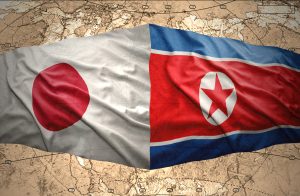On February 15, Kim Yo Jong, the powerful sister of North Korean leader Kim Jong Un, showed positive signals regarding a summit meeting between Kim Jong Un and Japanese Prime Minister Kishida Fumio.
“I think there would be no reason not to appreciate his recent speech as a positive one, if it was prompted by his real intention to boldly free himself from the past fetters,” the North’s state-controlled KCNA quoted Kim Yo Jong as saying.
She was reacting to Kishida’s remarks that he felt a strong need to change the relationship between the countries. The Japanese prime minister also said he is willing to meet Kim Jong Un with no preconditions – similar to offers made by Washington toward Pyongyang.
Japan’s Chief Cabinet Secretary Hayashi Yoshimasa said Japan was “paying attention” to the comments from Kim.
Japanese media have reported that Kishida might seek to visit Pyongyang as early as this summer. However, whether a summit meeting between Kim and Kishida will occur is questionable.
In her statement published in KCNA, Kim Yo Jong was clear that Pyongyang would be open to dialogue with Tokyo assuming that Japan agrees to drop the biggest issue between the two countries: the abduction issue.
In the first North Korea-Japan summit in 2002, Kim Jong Il, the father of Kim Jong Un, firmly recognized and apologized for North Korea’s abduction of Japanese citizens. North Korea admitted to abducting 13 people; five of them returned to Japan in October 2002. According to Pyongyang, the rest of them are dead.
The Japanese government, however, said it has identified 17 Japanese citizens as victims of abductions. It also claims that there have been no thorough investigations to find out whether the remaining abductees in North Korea are alive or dead. In this context, Tokyo has consistently demanded that Pyongyang accept every necessary measure regarding investigations of the abductees living in the North or were dead.
From Pyongyang’s perspective, the issue has been settled and no abductees remain to return to Japan. Japan continues to push for more efforts from North Korea at every opportunity.
Official-level dialogues have been conducted between the two countries in the past decades to resolve the conflicts, with no breakthroughs.
Hayashi, who is also Japan’s minister in charge of the abduction issue, said Kim Yo Jong’s demand that Tokyo must drop the abduction issue was “totally unacceptable.”
After South Korea established diplomatic relations with Cuba, one of the North’s closest friends, North Korea appeared to have attempted to initiate diplomacy with Japan in a bid to show the international community that it could also work with the U.S. allies in the region. However, as Tokyo has reiterated that there will be no normalization of relations between Japan and North Korea unless the abduction issue is resolved, Pyongyang may not be willing to hold a summit meeting given the circumstances.
North Korea’s continuous efforts to beef up its nuclear capability are perceived as a security threat by Japan. Along with Kishida’s vow to strengthen his country’s military capabilities, as narrated in the national security documents, Tokyo has sought to tackle the North’s missile threats and nuclear development. However, Japan’s leverage over Pyongyang’s nuclear development is limited, as the main actors are the United States and South Korea. According to Pyongyang’s official statements following its missile launches, its missile development is aimed at deterrence of the South Korea-U.S. alliance’s preemptive strikes against it while confronting the growing leverage of the United States in the region.
In the unexpected openness to North Korea diplomacy, Kishida might be seeking to improve his low approval ratings (which recently hit a record low of 14 percent). As it stands, Kishida would face an uphill battle in his bid for re-election as president of the Liberal Democracy Party, as other contenders – including Ishiba Shigeru, Motegi Toshimitsu, and Kono Taro – are outpolling him. Kishida seems to be holding his diplomatic achievements can tip the balance; he will have his first state visit to the United States in April and now may be eyeing a meeting with Kim Jong Un.
Pyongyang’s rare openness to Tokyo’s request for dialogue brought attention from Washington and Seoul. North Korea has not responded to their attempts to renew the stalled nuclear and inter-Korean talks for the past four years. Given Kim Jong Un’s focus on strengthening ties with Russia so as to create a space to evade the economic sanctions imposed by the United States and the United Nations, however, experts are skeptical about the possibility of Kishida and Kim holding a summit in Pyongyang this summer.

































